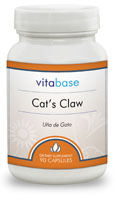| |
Cat's claw |
|
| Cat's claw (uncaria tomentosa) is a woody vine native to the Amazon rainforest and other tropical areas of South and Central America. Cat's claw is a thorny vine that can climb as high as 100 feet. The cat's claw plant is a climbing shrub (vine-like) with claw-like thorns on the stems. Cat's claw consists of the dried bark from the root or stem of Uncaria tomentosa or Uncaria guianensis (two Amazonian vines). The herb earns its name from the curved thorns on the vine that resemble the claws of a cat. The thorny spines are woody, paired, and curved like a cat's claw. The sap has a watery and astringent taste. The bark is fissured and ranges from a yellow to yellowish-green in colour. The inner bark and roots are used in medicinal preparations. Cat's claw has a long history of use as a folk medicine by native peoples to treat intestinal complaints, asthma, wounds, cancer, tumors, arthritis, inflammations, diabetes, irregularities of the menstrual cycle, fevers, ulcers, dysentery, and rheumatism. |
| |
Active constituents of cat's claw |
|
| The inner bark of cat's claw is the main source of medicinal activity, although the roots and leaves are also used. Cat's claw contains different alkaloidal constituents, pentacyclic oxindoles and tetracyclic oxindoles. Uncarine C and uncarine E are two stereoisomers of the pentacyclic oxindoles. Tetracyclic oxindoles found in cat's Claw include mitraphylline, rhynchophylline and isorhynchophylline. Other ingredients extracted from cat's claw include quinovic acid glycosides, polyhydroxylated triterpenes, steroidal compounds (beta-sitosterol, stigmasterol, and campesterol), ursolic acid and oleanolic acid. The active constituents are quite variable and depend upon the time of the year when the plant is harvested. While the stem bark has some activity, the root is three to four times more active than the stem bark. |
| |
Medicinal uses and health benefits of cat's claw |
|
| Cat's claw is used as a medicinal herb primarily for immune system stimulation. Glycosides isolated from the bark of cat's claw
has antiviral activities in vitro against vesicular stomatitis virus. Cat's claw's immunostimulating properties enhance the function of white blood cells to attack and digest carcinogenic substances and harmful microorganisms that may inhibit the growth of cancer cells and tumors. Krallendon, an immune-boosting extract of cat's claw, is used in the treatment of AIDS patients and persons who are HIV positive. Cat's claw exhibits anti-inflammatory properties, and is effective in the treatment of arthritis, gastritis, ulcers, and inflammatory bowel disorders. Cat's claw has a healing effect on the digestive system and good results have been achieved in treating chronic fatigue syndrome. Cat's claw's anti-inflammatory actions have been effective in relieving the inflammation and swelling prevalent in arthritis, rheumatism, and joint pain. Rynchophylline, one of the alkaloids isolated from cat's claw, has anti-hypertensive properties that may be beneficial in preventing the risk of strokes and heart attacks by reducing heart rate, lowering blood pressure, increasing circulation, and lowering blood cholesterol levels. Cat's claw's anti-inflammatory activity is due mainly to the glycosides present in the plant. These glycosides work synergistically to reduce the edema associated with the inflammatory reaction. |
| |
Dosage and administration of cat's claw |
|
| Standardized root and bark extracts are available in forms of dry extract, crushed bark, capsule, tablet, tea, and tincture. Extracts of cat's claw are often standardized to 4 percent alkaloid content for effective results. Dosages of commercial preparations range from 250 to 1000 milligrams daily. A tea can be made by boiling the root bark of cat's claw in water for five to 10 minutes and then straining the water. A recommended dose is one cup of tea three times daily. Dry, encapsulated standardized extract are taken with 20 to 60 mg daily. |
| |
Side effects, precautions, interactions |
|
| Few side effects have been reported from using cat's claw at recommended doses. Cat's claw should not be used by individuals with skin grafts or tuberculosis or by those receiving organ transplants. Cat's claw is not recommended for pregnant or nursing women or for women who are trying to conceive. Children under the age of two should not take cat's claw. Cat's claw should not be combined with hormonal drugs, insulin, and vaccines. Cat's claw is contraindicated in those suffering from coagulation disorders, tuberculosis, and autoimmune diseases. |
|
|
|
|
 Cat's claw's active elements include alkaloids, triterpenes, phytosterols and proanthrocyanidins. Researchers have isolated unique alkaloids in Cat��s Claw which stimulate the immune system by increasing white blood cell activity.
Cat's claw's active elements include alkaloids, triterpenes, phytosterols and proanthrocyanidins. Researchers have isolated unique alkaloids in Cat��s Claw which stimulate the immune system by increasing white blood cell activity.